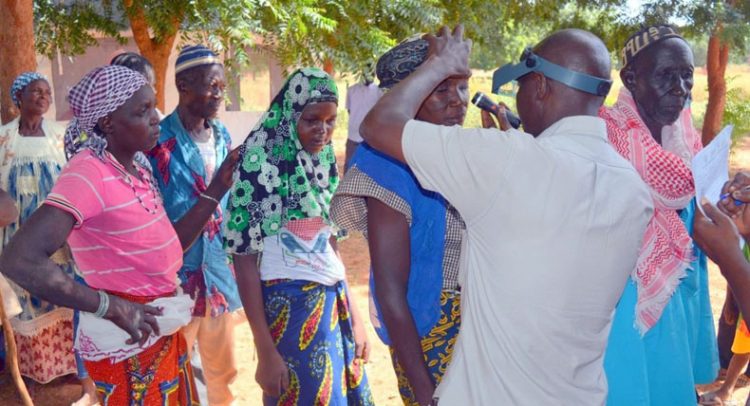A woman being screened for trachoma
Trachoma, a leading infectious eye disease that can cause blindness, has been eliminated as a public health problem in Ghana, the World Health Organisation (WHO) has revealed.
The announcement by the health agency makes Ghana the first country in sub-Saharan Africa to achieve this milestone, joining the likes of Laos, Oman, Cambodia, Nepal and Morocco who have also eliminated trachoma.
“Although there’s more work to do elsewhere, the validation of elimination in Ghana allows previously heavily-endemic countries to celebrate significant success,” WHO Director General, Dr Tedros Adhanom Ghebreyesus, stated.
He said the global trachoma community has learnt a lot from Ghana’s experience, including pioneered innovations like the use of height-based dosing for azithromycin, systematic active case-searches for trichiasis involving door-to-door, community-by-community fieldwork and intensive counselling of patients found to have trichiasis with an offer of immediate surgery, which produced considerable improvement in surgical uptake.
Dr Matshidiso Moeti, WHO Regional Director for Africa, indicated that Ghana’s success is as a result of the strong leadership at all levels, implementation of the full SAFE strategy right from the outset, strong collaboration between Ghana Health Service and its many partners and integration at lower levels of programme delivery, including community ownership.
“Hearty congratulations are deserved for this achievement,” Dr Moeti said.
The Minister of Health, Kwaku Agyeman-Manu, revealed that the success recorded was as a result of the tremendous amount of hard work by thousands of health, education and development workers to improve the lives of individuals with trachoma and their families.
“The government of Ghana is enormously grateful to its staff and to the many partners that have joined forces with us to eliminate trachoma and the cycle of poverty it triggers,” he pointed out.
Trachoma was identified in the 1950s as the most important cause of blindness in Ghana.
By the 1990s, the disease was known to persist as a significant public health problem in the Northern and Upper West Regions.
There were about 2.8 million people at risk of trachomatous blindness nationally, with an estimated 13 000 people suffering from trichiasis.
In 2000, the Ministry of Health and Ghana Health Service set up a National Trachoma Elimination Programme implemented the WHO-recommended elimination strategy, SAFE, which comprises surgery for trichiasis, antibiotics to clear infection, facial cleanliness and environmental improvement to reduce transmission.
Trichiasis surgery was provided at no cost, a critical Ghana Health Service decision reflecting the socio-economic disadvantage of people with trichiasis and the impact of the condition on future earning potential which has contributed to the elimination of the disease in Ghana.
By Jamila Akweley Okertchiri


